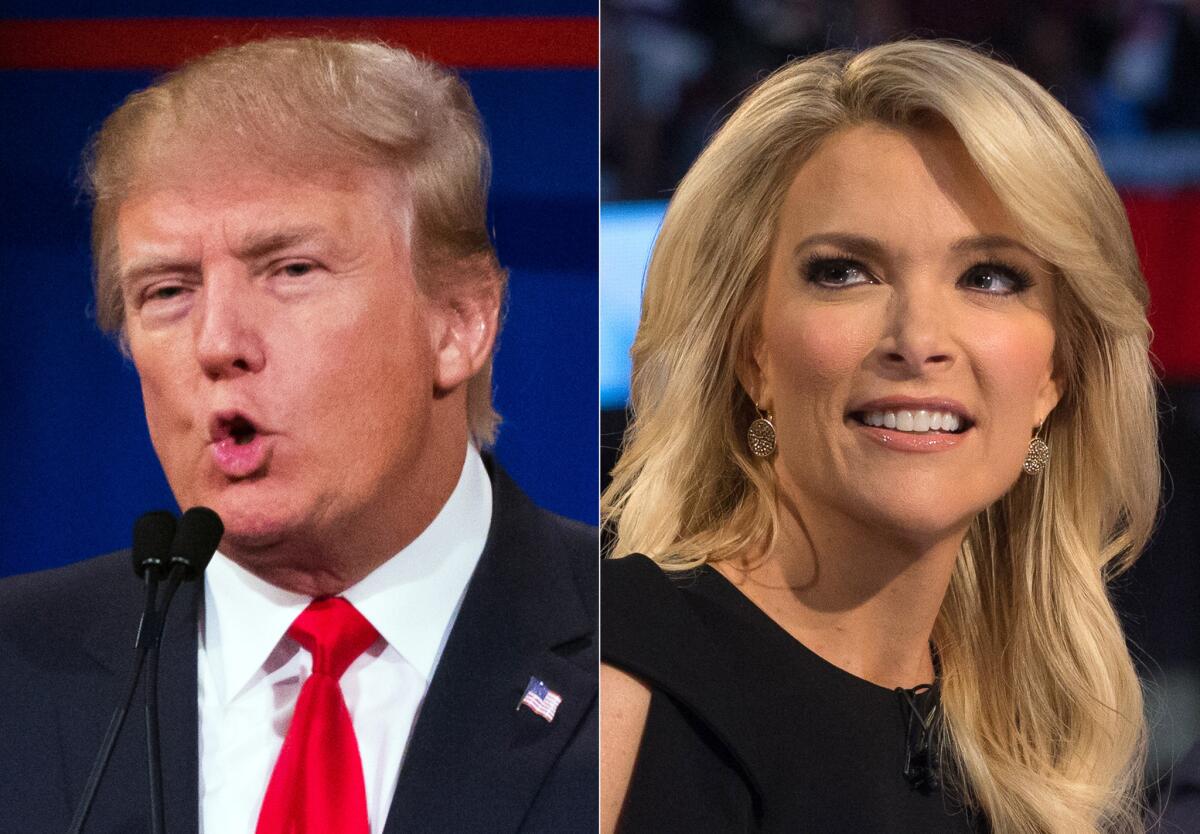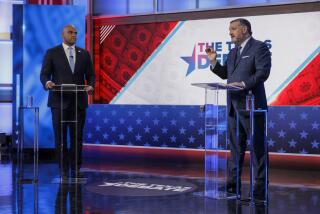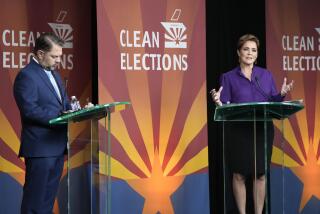Republican rivals take advantage of Trump’s absence in Iowa presidential debate

Megyn Kelly’s sharp questioning of Donald Trump in the first GOP debate led to his refusal to participate in Thursday’s Fox-hosted debate.
- Share via
With Donald Trump boycotting, his Republican rivals used the opportunity to pummel one another Thursday night in a contentious debate that offered one of the last chances to ply Iowans before the first presidential vote of 2016.
Trump was gone but not forgotten.
The first question from co-moderator Megyn Kelly, the target of Trump’s ire, addressed “the elephant not in the room tonight,” a reference to the absent national front-runner.
Sen. Ted Cruz of Texas, who is battling the billionaire businessman for Iowa’s top spot, responded in a humorous vein. “Let me say, I’m a maniac and everyone on this stage is stupid, fat and ugly, and Ben [Carson], you’re a terrible surgeon,” Cruz joked, delivering some insults Trump has thrown and some he made up.
Cruz then turned serious, praising the six other candidates for “showing the men and women of Iowa the respect to show up and make the case to the people of this state.”
Trump pulled out of the debate after accusing the host network, Fox News, of bad faith and saying Kelly was biased against him.
As rivals shared the spotlight at the Iowa Events Center in downtown Des Moines, Trump appeared less than three miles away at Drake University, where he put on a lively fundraiser for military veterans. Several other cable networks carried at least a portion of the event live.
The debate was the seventh of the Republican presidential campaign and seemed unlikely to dramatically recast the race ahead of Monday’s Iowa caucuses.
Without Trump onstage badgering him, former Florida Gov. Jeb Bush turned in perhaps his strongest debate performance, while Cruz seemed less assertive than usual and Sen. Marco Rubio of Florida more harsh, even during the repeated invocations of his religious faith.
It is unclear, though, how many Iowans remain open to persuasion.
Both Bush and Rubio noted Trump’s absence.
Rubio, asked how he would unite the warring factions of the Republican Party, took the opportunity to belittle Trump.
“He’s an entertaining guy. He’s the greatest show on Earth,” Rubio said. But, he went on, “this campaign is about the greatest country in the world and a president who has systematically destroyed many of the things that made America special.”
Bush, addressing the prospect of splintering the Republican establishment vote, said he trusted the judgment of early-state voters, before jokingly pining over Trump’s absence. “I kind of miss Donald Trump; he was such a little teddy bear to me,” he said.
From that point on, Trump went unmentioned for the most part as the candidates fell back on old talking points and turned to a handful of familiar issues, including immigration, national security and the perpetual argument over which of them is the truest conservative and most able to win in November.
There were some areas of vigorous disagreement, none more so than immigration, a perpetual thorn in the GOP contest.
Rubio was asked to square his opposition to a path to citizenship while running for Senate in 2010 with his cosponsorship two years later of legislation that would have created such an opportunity.
He argued that at the time he opposed the path to citizenship, it was “code for amnesty,” a near-instant legalization of those in the country illegally. He said he has not strayed from that belief and laid out his immigration plan: enforce existing immigration laws and beef up border controls before determining what to do with the millions in the nation illegally.
Bush said Rubio’s position amounted to a flip-flop.
“He led the charge to finally fix this immigration problem that has existed now … for 30 years,” Bush said. “And then he cut and ran, because it wasn’t popular amongst conservatives, I guess.”
Rubio said Bush, his former mentor in Florida politics, was no different. He cited Bush’s current support for a path to legal residency, as opposed to citizenship.
“You used to support a path to citizenship,” Rubio said.
“So did you,” Bush retorted.
Cruz was drawn into the fight when Rubio accused of him of shifting his position as well. “This is the lie that Ted’s campaign is built on,” he said, “that he’s the most conservative guy and everyone else is a RINO,” or Republican in name only.
Cruz responded by saying Rubio was “very charming” but failed to keep the promises he made to Floridians who elected him.
The candidates also clashed over fighting terrorism, with Rubio portraying his fellow senators as insufficiently tough in the fight against Islamic State, also known as ISIS.
“The only budget that Ted has ever voted for is a budget that Rand Paul sponsored that brags about cutting defense spending,” he said, referring to the senator from Kentucky after Cruz called for “carpet bombing” that would “utterly and completely destroy ISIS.”
Bush, in turn, attacked Rubio and Cruz for not backing a Senate vote to authorize military force in the Middle East. “They had a chance to show support, and it wasn’t popular at the time,” Bush said. “It became popular after the attack in Paris and San Bernardino. Now we hear the tough talk.”
Paul assailed Rubio for rejecting his Senate amendment to ensure tougher scrutiny of foreign students and refugees as part of legislation to “give citizenship to those who came here illegally.”
“I just don’t think Marco can have it both ways,” Paul said. “You can’t be in favor of defending us against … radical Islam if you’re not for border security.”
While there were some heated exchanges, the candidates at times declined to engage more vigorously, even when goaded by the moderators, Kelly and her Fox colleagues Chris Wallace and Bret Baier.
At one point, Cruz assailed Wallace for egging the candidates into attacking one another, rather than draw out a substantive discussion of issues.
“It is a debate, sir,” Wallace responded acerbically.
“Well, no,” Cruz fired back. “A debate actually is a policy issue.”
The candidates aimed some of their sharpest barbs at a pair of perpetual targets, President Obama and Democratic front-runner Hillary Clinton.
New Jersey Gov. Chris Christie, a former U.S. attorney, said there was “no one on this stage better prepared to prosecute the case against Hillary Clinton than I am.”
“When I take her on, I guarantee you one thing: She will never get within 10 miles of the White House,” he said. “The days for the Clintons in public housing are over.”
Christie reiterated his assertion that he was far more qualified for the presidency as a chief executive than any of the senators running. He dismissed the talk of grass-roots versus establishment support for different candidates by suggesting the distinction means little to the frustrated voter who wants to see action in Washington
Ohio Gov. John Kasich renewed his call for an end to political brinkmanship. “We have to come together as a country and we have to stop all the divisions,” he said.
Retired neurosurgeon Carson, a onetime national front-runner who has mostly faded from contention, again argued that his lack of political experience was an asset. “We need people who think outside the box and can solve problems,” he said.
The session, lasting just under two hours, did touch on a few lesser-worn issues.
Bush restated his support for statehood for Puerto Rico but opposed a federal bailout of its struggling economy, and said the country needed to make structural changes to reform its finances.
Asked about the tainted-water crisis in Flint, Mich., Kasich was careful to avoid criticizing Michigan’s GOP Gov. Rick Snyder for his slow initial response. But, he said, as a chief executive “there are many crises that come.... You’ve got to be on top of it, you’ve got to go the extra mile.... When you see a problem, you’ve got to act quickly to get on top of it.”
Four second-tier candidates debated for an hour earlier Thursday, bemoaning a political process and press that they believe has marginalized them to the sidelines of the race.
Former Arkansas Gov. Mike Huckabee, asked why he was failing to re-create the message that won him the 2008 Iowa caucuses, responded: “I don’t think it’s that the message isn’t working. I think it’s the message isn’t getting out.”
After the debate, Huckabee and former Pennsylvania Sen. Rick Santorum headed over to Trump’s fundraiser for veterans.
mark.barabak@latimes.com
Twitter: @markzbarabak
michael.finnegan@latimes.com
Twitter: @finneganLAT
seema.mehta@latimes.com
Twitter: @LATSeema
Barabak reported from Orange City, Iowa, and Finnegan and Mehta from Des Moines.
ALSO:
5 things to watch for in the GOP debate, even without Donald Trump
How Martin O’Malley could decide who wins the Democratic caucuses in Iowa
Fighting in Iowa to regain evangelical vote, Ted Cruz woos crowd at antiabortion rally
More to Read
Sign up for Essential California
The most important California stories and recommendations in your inbox every morning.
You may occasionally receive promotional content from the Los Angeles Times.













